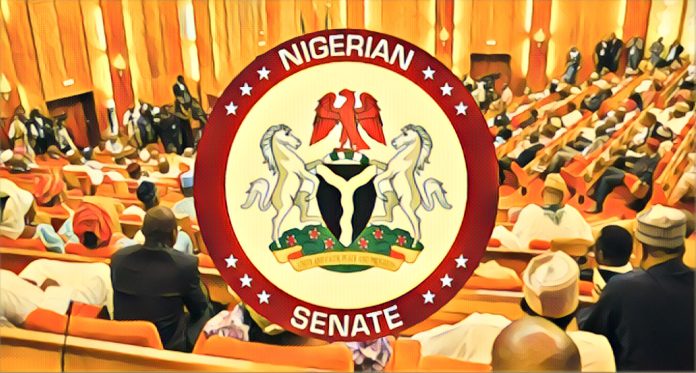Key points
- Senate debate on tax reform bill causes heated dispute.
- Ndume demands proper procedure for the controversial bill.
- Experts invited to address Senate despite strong opposition.
A Wednesday session of the Nigerian Senate erupted into chaos as lawmakers clashed over the controversial Tax Reform Bill, which unexpectedly came up for debate despite not being included on the agenda for the day.
The session, led by Deputy Senate President Jibrin Barau, a member of the All Progressives Congress (APC) from Kano North, grew increasingly heated after Senate Leader Opeyemi Bamidele, also of the APC from Ekiti Central, invoked Order 12(1) of the Senate Standing Rules.
This move proposed inviting experts, including Tanimu Yakubu, the Director-General of the Debt Management Office (DMO), and Zacch Adedeji, the Chairman of the Federal Inland Revenue Service (FIRS), to address the Senate on the Tax Reform Bill.
The tension builds
The debate began after the Senate had already passed two bills for their second reading and referred them to the relevant committees. At this point, Bamidele raised a motion to invite the tax experts to provide insight on the proposed tax reforms.
Senate President Barau seconded the motion and directed the Sergeant-at-Arms to allow the visitors into the Chamber.
However, not all senators were in agreement. Senator Mohammed Ali Ndume, representing Borno South and a member of the APC, immediately opposed the motion.
He pointed to the Senate Rules, which prohibit visitors from addressing the Chamber on matters not included in the Order Paper, and argued that the Tax Reform Bill was too significant to be addressed without following proper legislative procedures.
“This is a very important matter,” Ndume said. “We must follow established procedures. If we are to discuss this issue today, there must be a supplementary Order Paper to reflect it. Nigerians are watching, and this issue cannot be rushed.”
Ndume continued, urging the Senate to remain diligent in representing the people’s interests: “Mr. President, you can have your way, but I will have my say. Tax reform is sensitive, and our people are deeply affected by this matter. We must do this right.”
A heated exchange
According to a report by Vanguard, Deputy Senate President Barau, however, dismissed Ndume’s objections. In a sharp retort, Barau said, “The Chamber has no time for rhetoric. We are here for facts.” His comments set off a fresh round of anger, with Ndume accusing Barau of undermining his concerns because of his position.
“Is it because you are sitting there that you’re saying a Senator is speaking rhetoric? You can rule me out of order, but I will speak for Nigerians,” Ndume shot back, his voice rising with frustration.
Barau quickly ruled Ndume out of order, allowing the visitors to enter and address the Chamber on the proposed Tax Reform Bill, despite the ongoing objections. The situation grew even more intense as other lawmakers weighed in on the debate.
Tax reform bill: A crucial but divisive issue
The Tax Reform Bill, introduced by President Bola Tinubu, aims to overhaul Nigeria’s tax framework, a move that has been billed as essential for the country’s economic stability. But the bill has faced significant resistance from a range of stakeholders, including state governors and members of the National Economic Council, due to concerns over its potential impact on various sectors.
For many senators, the proposed reforms are seen as crucial to addressing Nigeria’s long-standing fiscal challenges. But the manner in which the bill is being handled has caused deep divisions within the Senate, highlighting the challenges of forging consensus on one of the country’s most pressing issues.
The Senate session on Wednesday was a reflection of those divisions. While some senators, like Bamidele and Barau, were eager to move forward with the discussion, others like Ndume voiced concern over the rushed approach, arguing that it was essential to follow the correct legislative procedures.
A Divided Senate
The incident in the Senate chamber underscored the contentious nature of the Tax Reform Bill and the divisions it has exposed within the upper house of Nigeria’s National Assembly.
On one side, proponents of the bill believe it is necessary for the country’s economic future, but opponents caution that the reforms need to be carefully scrutinized to ensure they do not disproportionately affect ordinary Nigerians or stifle economic growth.
Although the bill has been identified as a top priority for President Tinubu’s administration, the path to its passage remains uncertain. Some senators fear that rushing the reforms without sufficient debate could undermine their effectiveness and create unintended consequences.
In the end, while the Tax Reform Bill may have passed through the Senate’s doors for now, its passage is far from guaranteed. The resistance from key senators and other stakeholders will likely continue to shape the debate in the coming weeks, as the bill moves closer to a final vote.
Whether the reform can succeed will depend on how lawmakers navigate these divisions and balance the need for urgent change with careful, transparent decision-making.



